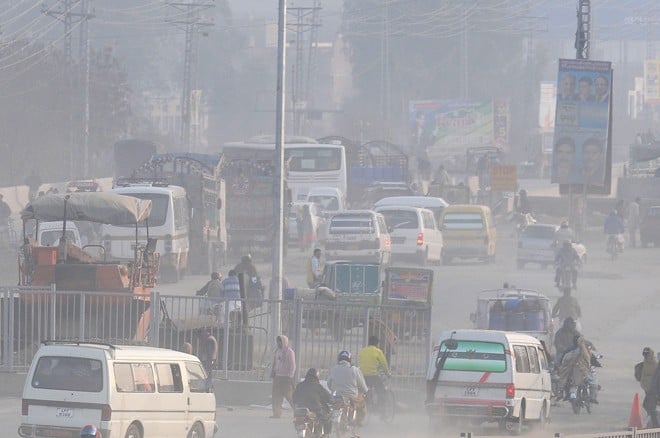

The Punjab government often boasts about Lahore being a developed city and plans to further develop it according to international standards. However, a recent disclosure by a World Health Organisation (WHO) should deal a severe blow to the government’s smugness. According to the report, Lahore is among the 10 most polluted cities in the world. (The findings of the report were based primarily on the atmospheric pollution of the respective studies.)
Mian Mehmood-ur-Rasheed, MPA Pakistan Tehreek-e-Insaf (PTI) and Leader of the Opposition in the Punjab Assembly, raised this issue on the floor, condemning the government for its failure to provide the people with a clean, pollution-free air to breathe in.
Environmentalists list several causes behind the spread of atmospheric inclusion such as the open burning of garbage and industrial waste, the emission of smoke by two-stroke engines and unfit vehicles, the consumption of fossil fuel containing lead in high quantity; the use of rubber tyres and coal as fuel in factories, the cutting of trees and the fast disappearance of green areas in the city etc.
All of the abovementioned reasons point significantly to Lahore where no government has successfully attempted to check these practices.
Pakistan’s Environmental Protection Agency (EPA) also recently declared that "air pollution is costing Pakistan one percent of its total GDP in the form of respiratory health problems and premature deaths."
Another factor which has come into play and added to the misery of the citizens is the uncontrolled demolition and construction activity going on in the city at a large scale, making the people vulnerable to allergies caused by the inhalation of dust and other harmful particles.
Tariq Iqbal, a resident of Bagh Munshi Ladha near Azadi Chowk, says the whole community is suffering from diseases of different types. "Dust particles [from the debris] mix in the air. A large number of children, adults and senior citizens are suffering from cough, allergies and asthmatic problems due to this."
Iqbal also says the demolition work was supposed to finish within a given time period but it seems to go on forever.
The situation, he says, is further aggravated when traffic is allowed to pass through the residential areas which serve as a detour during the closure of the main road leading to the Azadi Chowk. These vehicles bring along dust which stays in the air for long.
There are several other individuals and families who have been affected by the construction activity going on at the Chowk. The common belief is that no code of rules and regulations has been followed and that everything is haphazard and unplanned. To quote Muhammad Waseem, a local, "We cannot sleep at night because of the noise created by the rattling of hammers and other construction activity."
When contacted, Naseer ur Rehman, Director Punjab Environment Department, endorsed the fact that all construction projects ought to be monitored by the executing companies. "They are bound to ensure the activity is not polluting the air."
He also says that the Lahore Development Authority (LDA) and the concerned Town Municipal Authorities (TMAs) direct the Traffic Engineering and Planning Agency (TEPA) for proper covering of project sites until they are complete.
Naseem believes the concerned officials of the department are vigilant and they can order suspension of construction activity and fine the developers if they think they are not taking safety measures to avoid air pollution.
The department, he says, has directed the private developers who build plazas etc to properly wrap the construction sites and manage debris in a way that it does not pollute the environs. In the event of violation, the cases are taken to courts which prescribe penalties and punishments.
Environment specialist Ahmed Rafay Alam is of the view that the projects should be properly planned with the aim to protect the environment. Unfortunately, the environment department has capacity issues and also lacks staff and funds.
"There is a dire need to employ environment staff on permanent basis that can enforce environmental laws," he says, adding that some of the measures taken to minimise risks include blocking the roads (where construction work is going on) for commuters and pedestrians and having the houses near the site vacated.
A contractor, requesting anonymity, tells TNS of a "practice wherein an entire project site or area is demolished instantly. If such work is done in phases, the mess would not be too great."
The contractor doubts that demolition is done to avoid suspension of project due to stay orders from courts. The governments fear if they demolish one part, the people would move court.
He says the best practice is to have the construction sites properly wrapped. "The construction companies should make prior plans to compile the dust in a controlled manner so that it does not mix in the air.
"They must also know which types of gases would be useful for better purification of air in the affected areas," he says.
Dr Arshad, who runs a medical clinic at Ravi Road near the Azadi Chowk, speaks of receiving patients of stomach and lung infections which are caused by the polluted air. "Allergies have become very common and are affecting every second person going around," he says.
People with allergy complaints should avoid going to places where some sort of construction work is in progress. The doctor also recommends face masks.